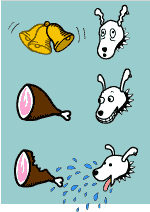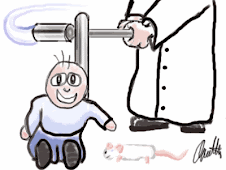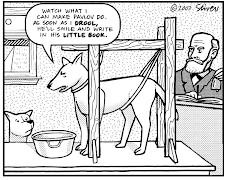The theory of B.F. Skinner is based upon the idea that learning is a function of change in overt behavior. Changes in behavior are the result of an individual's response to stimuli that occur in the environment. A response produces a consequence such as defining a word, hitting a ball, or solving a math problem. When a particular Stimulus-Response pattern is reinforced, the individual is conditioned to respond. The distinctive characteristic of operant conditioning relative to previous forms of behaviorism is that the organism can emit responses instead of only eliciting response due to an external stimulus.
Reinforcement is the key element in Skinner's Stimuli-Response theory. A reinforcer is anything that strengthens the desired response. It could be verbal praise, a good grade or a feeling of increased accomplishment or satisfaction. The theory also covers negative reinforcers -- any stimulus that results in the increased frequency of a response when it is withdrawn (different from adversive stimuli -- punishment -- which result in reduced responses). A great deal of attention was given to schedules of reinforcement (e.g. interval versus ratio) and their effects on establishing and maintaining behavior.
The technical term for "an event started" or "an item presented" is positive, since it's something that's added to the animal's environment.
The technical term for "an event ended" or "an item taken away" is negative, since it's something that's subtracted from the animal's environment.
Anything that increases a behavior - makes it occur more frequently, makes it stronger, or makes it more likely to occur - is termed a reinforcer. Often, an animal (or person) will perceive "starting Something Good" or "ending Something Bad" as something worth pursuing, and they will repeat the behaviors that seem to cause these consequences. These consequences will increase the behaviors that lead to them, so they are reinforcers. These are consequences the animal will work to attain, so they strengthen the behavior.
Anything that decreases a behavior - makes it occur less frequently, makes it weaker, or makes it less likely to occur - is termed a punisher. Often, an animal (or person) will perceive "ending Something Good" or "starting Something Bad" as something worth avoiding, and they will not repeat the behaviors that seem to cause these consequences. These consequences will decrease the behaviors that lead to them, so they are punishers.
Applying these terms to the Four Possible Consequences, you get:
Something Good can start or be presented, so behavior increases = Positive Reinforcement.
Something Good can end or be taken away, so behavior decreases = Negative Punishment
Something Bad can start or be presented, so behavior decreases = Positive Punishment
Something Bad can end or be taken away, so behavior increases = Negative Reinforcement.
http://www.wagntrain.com/OC/#Operant
http://tip.psychology.org/skinner.html
Suscribirse a:
Enviar comentarios (Atom)



No hay comentarios:
Publicar un comentario